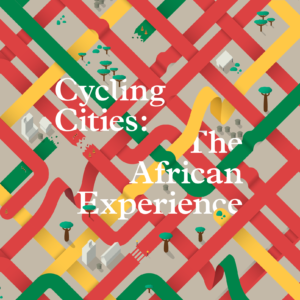https://www.gofundme.com/f/Support-the-African-Experience We are pleased to announce the new research-publication project Cycling Cities: The African Experience spearheaded by Njogu Morgan (Wits University, Johannesburg, South Africa/University College London), Yusuf Madugu (Bayero University, Kano, Nigeria), Ruth Oldenziel (TU Eindhoven), and Peter Norton (University of Virginia). The research and publication will be of interest to scholars, students, policymakers, and others. Like the companion, Cycling Cities: The European Experience, this will be an edited book containing 17 case studies from all regions of the African continent.
We are pleased to announce the new research-publication project Cycling Cities: The African Experience spearheaded by Njogu Morgan (Wits University, Johannesburg, South Africa/University College London), Yusuf Madugu (Bayero University, Kano, Nigeria), Ruth Oldenziel (TU Eindhoven), and Peter Norton (University of Virginia). The research and publication will be of interest to scholars, students, policymakers, and others. Like the companion, Cycling Cities: The European Experience, this will be an edited book containing 17 case studies from all regions of the African continent.
From Aba to Zomba via Cairo to Cape Town, this book aims to be a catalyst for change on the beautiful continent. Following the Sustainable Urban Mobility (SUM) research programme for the long-term development of transitioning towards sustainable urban mobility networks and technologies this book brings together interdisciplinary voices and minds from Africa and Europe. Together, we will build an intercontinental network of knowledge and expertise aimed at providing local solutions to global problems.
Did you know that some post-colonial African leaders sought to use the bicycle as a tool for empowerment? Julius Nyerere, upon leading Tanzania to independence, saw the bicycle as more than just a mode of transport – it was a key tool in his Ujamaa socialist vision for the future of his people. In other cases, notably in South Africa, the long shadow of colonialism has overshadowed sustainable development in favour of racial-based policies, the automobile, or both.
But in all cities, pro-bicycle activism is making a difference. From redesigned roads and transport policies to critical mass movements, cyclists across Africa are fighting to reclaim the streets. The Africa Experience is there to tell these stories and more. With maps, photographs, infographics, and tables, this book goes beyond just storytelling and provides a narrative grounded in academic rigour but with coffee table book ease of reading. It will provide a captivating story for both scholars and the casual reader alike.
By supporting this project, you will feeding into a global sustainability movement that thinks bike. Cycling Cities not only aims to spread the little-known history of the bicycle in Africa but is also directed at building a network of like minded people from across academia, policy making, activism, and NGOs. Our authors and editors have donated their time to building this project and these networks and will continue to do so in the future. This book is a small step towards that future. It takes a village to raise a child and it takes a movement to make a difference.
Aba, Nigeria – Uche Uwaezuoke Okonkwo
Bamako, Mali – Issa Fofana, Issa Togola
Cairo, Egypt – Nourhan Abdelghaffar, Carine Khalil, Ranya Ayman Lotfyl
Cape Town, South Africa – Phano Liphoto, Siddique Motala, Marianne Vanderschuren, Michael Keith
Chipata, Zambia – Chris Chirwa, Emmanuel Kamuna
Dar es Salaam, Tanzania – Frank Edward
Douala, Cameroon – Salifou Ndam, Patrick Rérat
Gulu, Uganda – Patrick Otim
Johannesburg, South Africa – Njogu Morgan
Kampala, Uganda – Tom Courtright
Kano, Nigeria – Yusuf Madugu
Kisumu, Kenya – Jethron Ayumba Akallah
Maputo, Mozambique – Classio Joao Mendiate, Eduardo Pelembe
Mzuzu, Malawi – Dennis Mwanyanja Mwiba
Nairobi, Kenya – Dorcas Nthoki Nyamai
Tamale, Ghana – Sabine Luning, Samuel Ntewusu, Gideon Asmah
Zomba, Malawi – David Drengk
Research, writing, presentation in 2022-2023 with research group meetings in Accra (Sept 26-29, 2022), Johannesburg (November 2022), Dar Es Salaam (January 2023), Long Beach (October 2023), Tamale, Ghana (June 4-8, 2024). Publication date May 2025.